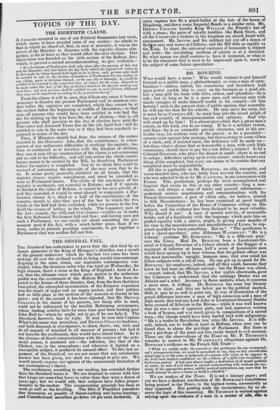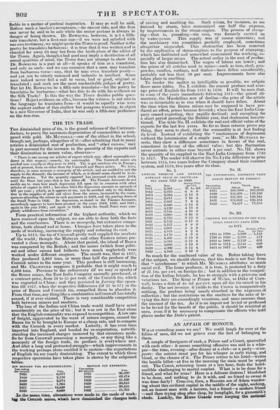DR. BOIVRING.
WHO would have a name ? Who would venture to put himself forward as a public man, a philanthropist, or even a man of state- business ?—unless, indeed, his connexions and hereditary hold upon power enable him to carry on the business as a good job.
Let a man gild his trade with titles, orders, and splendour—he is safe; but as long as he is a mere man, and striving only with manly energies to make himself useful to his country—let him beware ! such is the present state of public opinion, that assuredly he will pay too dear for his whistle. He may serve the state, but it must be as CURT1US did : he must leap into the Moral gulph of lies and scandal, of misrepresentation and calumny. And who will stand up for him ? It is almost proverbial, that a great man's cousin, in this land, can do no wrong. If he is a military tyrant, and flogs—he is an estimable private character, and in the par- ticular case, his motives were of the purest : is he a peculator— arrears exist against him perhaps, but that is owing to some villain of a clerk, and, if insisted upon, the deficiency will be made up— but then, what a shame that so honourable a man, with such high. connexions, should have to pay for a low fellow's crimes ! Is he a Colonial Governor, who plays the despot in small—there is no end to eulogy; defenders spring up in every corner; nobody knows any thing of the complaint, but every one seems to be certain that any complaint must be unjustifiable.
All this is applicable to Dr. BOWRIINIG; an able, energetic, and warm-hearted man, who has lately been serving the country, and who was selected to do so by Mr. CANNING, in our intercourse with France. This gentleman, perhaps the most accomplished oral linguist that exists in this or any other country—long a mer- chant, and always a man of talent and general information— undertook certain negotiations and communications with the French Government; a part of which only, we believe, related to Silk Manufactures : he has been examined at great length before the Committee of the House of Commons sitting on this subject, and his evidence has been declared to be most valuable. Why should it not? A man of mental activity, of mercantile habits, and of a familiarity with the language which puts him on perfect equality with a native, might, by giving some months of his time to the nianufactures and manufacturers of Lyons, be sup- posed qualified to learn something. But no ! "The gentleman is not a shawl-merchant," cries Alderman WAITHMAN; "He is a Liberal," exclaims Mr. ROBINSON; "He is a fifth-rate poet," says the Times. Had Dr. BOWR1NG been a Lieutenant-Ge- neral or Colonel, Governor of a Colony abroad, or the flogger of a regiment of infantry at home, half a score of honourable men would have sprung up to bear witness, that the gallant officer was the most honourable, upright, humane man, that ever ruled his fellow-subjects with a rod of iron. No one got up to speak for Dr. BOWRING: his employers, indeed, said all they could, because they knew he had been an efficient servant : but the House was silent, —except, indeed, that Mr. Iftvx No, a few nights afterwards, gave the Commons to understand that the unhappy Doctor was an Atheist and a rebel. Accuracy in these matters, when it concerns a mere man, is trifling. Dr. BOWRING has none but literary orders to show, and they are below par in the political market. Still, it may be as well to point out, by way of illustration of the grand difference between a man of high connexion and a man of high merit, that had any Lord John or Lieutenant-General Stubbs been accused of Atheism in the House,—while it was well known that he was a man of apparent piety, and had, moreover, written a book of hymns, and was much given to compositions of a sacred turn,—the charge would have been burled back with indignation. "He is a trader in Revolution too," cries Mr. IRVING. It is diffi- cult, indeed, not to traffic at least in Reform, when men can be found thus to abuse the privilege of Parliament. But there is also a privilege of the press not less rarely turned to evil account.. These are the observations of the Times on Mr. P. Tficossoses remarks in 'answer to Mr. WAITHMAN'S allegations against Dr. BOWR1NG'S evidence on the French Silk Trade— "While we readily make the amends to this gentleman for our correspond- ent's misrepresentation, we must be permitted to say, that we feel considerable misgivings as to the sense or judgment of a person who relies, as he appears to do, with such implicit confidence on the evidence of a fifth-rate translator of barbarous poetry. A bad poet almost implies a destitution of all sound qualities of mind ; no man of real talent or correct understanding will, without the cer- tainty of the appropriate power, exhibit poetical pretensions, any more than he would attemptto carve a statue or build a cathedral." • We are readers of the Times. It is not a literary paper; and yet we have a distinct recollection of Dr. Bowituva's translations being praised in the Times, in the highest terms, successively as they -appeared. But putting aside the inconsistency,-let us .ob- serve the logic of this reasoning. Mr.THOSISON is warned against retying uposr the- evidence of a man in a matter of silk, Who is 'feeble in a matter of poetical inspiration. It may as well be said, Refuse such a banker's acceptance,-he cannot ride, and the firm can never be said to be safe while the senior partner is always in danger of being thrown. Dr. BOWRI NG, however, is ni:t a fifth- rate translator, but a first-rate one-if we were not satisfied with our own testimony, we might quote the Times in proof. Neither is the poetry he translates barbarous: it is true that it was written and is chanted far away (it may be) from the birth-place of the editor of the Times. Again, though a bad podmay imply a destitution of all sound qualities of mind, the Times does not attempt to show that Dr. BOWRING is a poet at all-it speaks of him as a translator, and only as such: and we can conceive that a man may translate from barbarous verse-nay, that he may even translate poorly- and yet not be utterly unsound and imbecile in intellect. Some men indeed never feel a call to verse, bad or good, original or translated ; and such are the most uncharitable judges of poetry. But let Dr. BOWRING be a fifth-rate translator-let the poetry he translates be barbarous-what has this to do with his evidence on the Silk Trade? Is this the way the Times decides public ques- tions? Reject evidence on silks, because the witness is not nice in the language he translates from-it would be equally wise were the sapient author of this shallow but pompous warning, to object to a new Governor of India, that he was only a fifth-rate performer on the tom-tom.



























 Previous page
Previous page